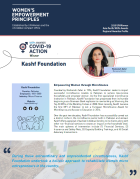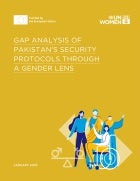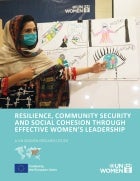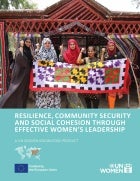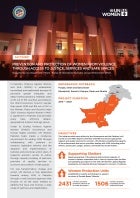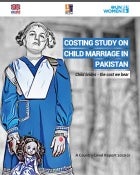1 - 20 of 57 Results
Pagination
Date:
This National Report on the Status of Women (NRSW) highlights the environment of the country for women and girls, which shapes and influences their lives
Date:
There are many barriers and challenges to the economic empowerment of women in distress, i.e., residents of shelters and prisons, while there are also success stories of their successful reintegration into society. This baseline study aims to understand the programs, policies, and practices for economic empowerment of women residing in shelters and prisons. Its geographical scope covers the cities of Islamabad, Karachi, Sukkur, Lahore, Multan, Peshawar, and Quetta.
Date:
Pakistan has the sixth-highest number of women as a staff officers and military observers in the UN Peacekeeping missions as of 2023. However, myriad set of challenges remain in meeting the 15% threshold, the global target set by the UN for women serving in military contingents. The research sheds light to the challenges but also showcases stories of Pakistani women peacekeepers who have overcome barriers and successfully served as peacekeepers.
Date:
The manual is meant to support primarily policymakers, practitioners and service providers who can advocate for and enhance a whole-of-government and whole-of-society approach in developing and implementing reintegration policies and practices in a coordinated manner.
Date:
Gender Assessment of Skills Development and Overseas Employment Opportunities for Women in Pakistan was conducted with the aim to increase understanding the existing skills development opportunities for Pakistani women
Date:
Shelters serve as a crucial refuge for survivors of violence, offering both protection and essential support services. In Pakistan, however, their effectiveness, accessibility and quality remains limited due to a variety of socio-cultural, structural and institutional barriers. This needs assessment of state-run shelters from across the country seeks to understand the challenges confronting shelters, their staff and residents, and inform evidence-based strategies and programmes that can enhance the services provided.
Date:
This summary report encapsulates the consolidated data from the first National Report on the Status of Women in Pakistan in 2023, providing a snapshot of the situation of women on key themes related to Gender Equality and Women Empowerment.
Date:
This pioneering study on the journeys of Gender-based Violence (GBV) Survivors through the justice system of Punjab was conducted by UN Women Pakistan with the aim to capture the voices and experiences of survivors themselves as they made their way through each step of the system and the essential services within it, specifically police, health sector and courts.
Date:
Strategic Note for UN Women Pakistan inline with UN Women Strategic Plan and United Nations Sustainable Development Cooperation Framework of Pakistan.
Date:
This publication showcases the results of Rapid Gender Assessment surveys (RGAs) on the impact of the coronavirus disease (COVID-19) in seven countries in Asia and the Pacific. For some of these countries, this is the second round of RGAs and thus these findings may follow up those of “Unlocking the Lockdown”. The report is meant to be a statistical snapshot that could inform responses to the crisis but is not meant to provide policy recommendations or analyze the policy context in each country.
Date:
Check out the profiles of the 2020 gender champions and learn the impacts they have created in enabling a more gender-equal business world.
Date:
This research analyses Pakistan’s security protocols through a dual lens of gender and peacebuilding and aims to fill the knowledge gap to support the integration of gendered perspectives into the security policies of Pakistan. It triangulates the global Women Peace and Security (WPS) Agenda with the Preventing Violent Extremism (PVE) practice to undertake a comparative analysis of National Action Plans of three regional countries: Jordan, Indonesia, and Bangladesh.
Date:
The research study analyses the gendered aspects of the ethnic and religious conflict in Pakistan that can potentially lead to a breakdown of social cohesion and stability. There was a focus on how women are affected by and implicated in situations of conflict and violence.
Date:
This report analyses the gendered aspects of the ethnic and religious conflict in Pakistan that can potentially lead to a breakdown of social cohesion and stability. In order to effectively understand the drivers of conflict and the factors that threaten community security and social cohesion focusing on women and young women, UN Women commissioned a research study titled: “Resilience, Community Security and Social Cohesion through Effective Women’s Leadership”.
Prevention and protection of women from violence through Access to Justice, Services and Safe Spaces
Date:
In Pakistan, Violence Against Women and Girls (VAWG) is widespread, normalized and legitimized because of pervasive gender inequality and deep-rooted patriarchy. Pakistan ranks at 151 out of 153 countries according to the World Economic Forum’s Gender Gap report 2018 and 164 out of 167 in the Women, Peace and Security Index 2019. Violence Against Women (VAW) is significant in Pakistan and pervades every class, ethnicity, religion, geographical location and age group.
Date:
[End Term Project Evaluation Report] The project “Economic Empowerment of Women Home Based Workers (HBWs) and Excluded Groups in Pakistan” had a three-year duration (April 2017-June 2020). The project is also referred as ‘the third phase of WEE Programme’ conceived jointly with Government of Norway’s support and funding through a shared strategic interest in promotion and protection of WHBWs.
Date:
Child marriage takes away a girl’s right to safe and healthy childhood, quality and complete education that can lead to decent economic opportunities, and social and political empowerment. Pakistan has the 6th highest number of girls married before the age of 18 in the world. Child marriage is prevalent due to several reasons including deeply entrenched traditions and customs, poverty, lack of awareness and/or access to education, and lack of security.
Date:
The activities of this manual are designed with practical exercises and can be used by national and provincial police departments, police training academies and other organizations as a guide to orient and sensitize law enforcement officials for attitude and behavior change through imparting information regarding concepts, laws, mechanisms, and procedures for dealing with cases of VAW.
Date:
UN Women Pakistan has developed a Training Manual on Enhancing Attitudes of Police towards Survivors of Violence Against Women with the aim to enhance the capacity of law enforcement officials for understanding gender dynamics and issues related to violence against women as well as dealing with VAW cases.
Date:
UN Women Pakistan, with Aurat Foundation as research partner, and in collaboration with key government and civil society partners, conducted a Women’s Safety Audit (WSA) in 5 cities across Pakistan, including Karachi, Dadu, Khairpur, Quetta and Rawalpindi, in order to better understand the status of women’s access to safe public spaces. Rigorous data analysis based on robust tools and methodology, collection of empirical evidence and comprehensive statistical examination was done to deduce findings of this important report in order to ensure the results are reached in a scientific manner and the recommendations are both pragmatic and effective.
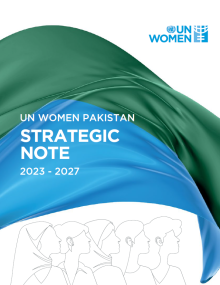
![[cover]](/sites/default/files/styles/search_image_140px/public/2024-06/pk-c972-national-report-on-the-status-of-women-960px.jpg?itok=YfC2hCVc)
![[cover]](/sites/default/files/styles/search_image_140px/public/2024-05/pk-cx-more-than-recreation-apr2024-960pxpx.jpg?itok=SpSBhLFk)
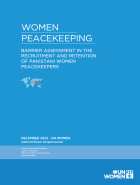
![[cover]](/sites/default/files/styles/search_image_140px/public/2024-02/bd-c652-pub2023027-el-regional-reintegration-960px.jpg?itok=5IyTMPC7)
![[cover]](/sites/default/files/styles/search_image_140px/public/2024-01/pk-c590-gender-assessment-of-skills-development-pakistan-960px.jpg?itok=xevcDlo5)

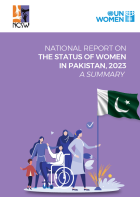
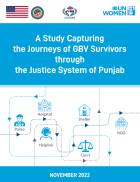
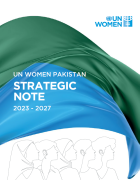
![[cover]](/sites/default/files/styles/search_image_140px/public/2022-06/ap_BLS21551_004_UNW_RGA_Regional_Report-FINAL-14Jun22-cover-960px.jpg?itok=2Fjp4P1X)
